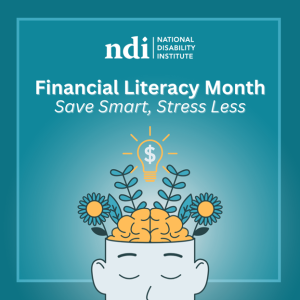By Thomas Foley, National Disability Institute Executive Director
In the 1980s, my high school offered what turned out to be my favorite class. It was called at the time, Consumer Economics, and it was  basically a precursor to what we call financial education today. Little did I know that this seemingly mundane elective would empower me to navigate the complex world of money, absolutely changing my life, impacting my financial and mental well-being for decades.
basically a precursor to what we call financial education today. Little did I know that this seemingly mundane elective would empower me to navigate the complex world of money, absolutely changing my life, impacting my financial and mental well-being for decades.
One of the most impactful lessons centered on the enigmatic concept of the credit score. What the heck was a credit score and frankly, why did I care? The class demystified this system, explaining how responsible borrowing and timely payments built a positive credit score, unlocking access to lower interest rates and better loan terms. Now, better loan terms and a lower payment was something I could relate to. Another revelation was the stark contrast between paying interest and earning interest. I vividly remember the examples of how quickly debt accumulated when being charged 18 percent interest on a credit card. This was compared to the power of compound interest, how even small amounts saved consistently could grow significantly over time. We even learned the Rule of 72. This simple formula estimates how long it takes for your money to double at a given interest rate. Divide 72 by the interest rate (as a percentage) to get the approximate number of years for doubling. For example, at a six percent interest rate, it would take roughly 72 / 6 = 12 years for my money to double. Yes, please, I’d rather have MY money double two or three times than pay interest to a credit card company.
However, the class taught me something even more important. It showed me that I had control over my short-term and long-term financial future. Decisions I made today, in the moment, would significantly impact not only my present, but also my future self. For a blind kid from the south side of Chicago, who didn’t have much control over his life, this was revolutionary. Looking back, my 1980s financial education class was a watershed moment. It fostered a sense of control over my finances and my life. It allowed me to make informed decisions about borrowing, saving and investing. While financial tools and landscapes have evolved, the core principles learned back then – building credit, understanding interest and practicing responsible budgeting – remain timeless and have continued to bolster my confidence through many difficult times.
I urge everyone to take a personal finance course or sign up for financial coaching, cause here’s a secret. The knowledge gained isn’t just about money, it’s about personal freedom, taking dominion over your life and creating better options for your future self. Be assured, that future self will thank you!
Whether you are individual with a disability or a family member, or working on behalf of a financial institution or community partner, NDI has the Financial Wellness Tools to help you or those you serve gain knowledge on ways to save money and worry less. From goal-setting and creating a spending plan, to choosing a bank or which card to use, these tools aim to give individuals the confidence and skills to improve their independence. NDI also offers free Quick Reference Guides designed to provide information in short, downloadable documents for disability service providers, nonprofits, financial professionals and municipalities. Access and share guides on Savings, Spending, Managing Money, Taxes & Free Tax Prep and more today.
Follow us on Facebook, Threads, Instagram and LinkedIn for tips and resources this Financial Literacy Month to empower individuals with disabilities to Save Smart, Stress Less about their financial future.
